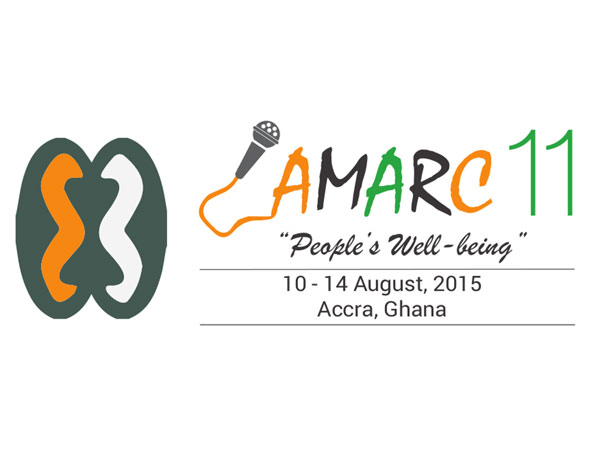Even more than in the past and regardless of the region, Community Radio finds that its everyday world has become one of dualities – of growing and tangible insecurity even as people aspire and struggle for basic security at multiple levels. The “global village” has become not even a global marketplace but a global mall and, all too often, a global stage for conflict. More than ever, the unique character and attributes of Community Radio need to be leveraged to build, transform and aggregate the strength of diverse communities desirous of and working towards people-centred security. More than ever, Community Radio presents itself as a unique resource for reframing and reconciling a world of dualities into a global community founded on equity in diversity.
In a globalized world, interconnected and interdependent but disjointed and imbalanced, Community Radio continues to play an unparalleled role in bringing a crucial diversity of voices, worldviews and values to the global discourse. However, it is also necessary for Community Radio to respond ever more constructively and strategically to constantly evolving politico-economic, communication and geosocial scenarios and their inherent challenges and opportunities. A necessary and invigorating but also complex task. To celebrate as well as strengthen the capacity of Community Radio in responding to multiple dualities, the 11th World Conference of AMARC (AMARC 11) will focus on the following themes: (1) Community Radio, holistic security and sustainable development; (2) Community Radio, culture and identity security and (3) Community Radio, conflict and institutional security
Community Radio, holistic security and sustainable development
The world is increasingly facing natural disasters, often related to climate change and the irresponsible management of natural resources. These disasters are both symptoms and illustrations of global inequities and those who pay the biggest price are the vulnerable communities and groups for whom Community Radio is a critical resource. The current Ebola epidemic highlights not only the interdependence of food security, nutrition security and health security but also how quickly their absence can threaten and impact global security and well-being. In transitioning from the Millennium Development Goals towards Sustainable Development Goals, the international development community led by the United Nations is further giving recognition that peace, inclusion, equity and accountability are at the root of sustainable development. These have always been the values of Community Radio and AMARC 11 is a perfectly-timed opportunity to ensure that it performs even more effectively and proactively.
Community Radio, culture and identity insecurity
Culture is another prism for the duality of security and insecurity. On the one hand, the globalized society is often projected as reflecting the identity pluralism of the so-called “multicultural” society. Yet, even in states that characterize themselves as open and democratic, political leaders are denouncing multiculturalism as a threat. This induced fear, sometimes related to a perceived loss of identity, is one of the reasons for extremely negative reactions to migration. At the same time, indigenous cultures are being marginalized and/or drawn into the homogenized constructs, including “reality” shows, of the dominant media. By its nature, and whether in Africa, Asia, the Caribbean, the Middle East and Latin and North America, Community Radio has developed an inclusive process towards citizenship and is an instrument for social cohesion and intercultural dialogue. Its mandate fully reflects the spirit of the community it represents at the same time that it promotes the equal participation of women, youths and others traditionally marginalized from community discourse. It has preserved and renewed multiple languages, thereby not only revitalizing their communities but also enriching the heritage of the world. At the same time, it is harnessing the newest technologies, taking advantage of non-terrestrial platforms and social media. In promoting alternative worldviews and discourse, Community Radio continually contends with powerful opposing interests. In this regard too, AMARC 11 will highlight its success stories and illuminate its challenges.
Community Radio, conflict and institutional insecurity
Community Radio has not been immune to, and in fact has often targeted in, the growing incidence worldwide of conflict and violence and general physical insecurity. Threats by armed groups in conflict situations, censorship, terrorist attacks on installations increasingly undermine the security of Community Radio as well as their journalists and activists. Where the threats may not be overt, various mechanisms, including legislation and regulation or their deliberate absence or distortion, are used to dim the dialogic voice of Community Radio. Throughout, Community Radio has played a key role in conflict prevention and resolution at all levels, from the community to the national sphere and even across boundaries. Community Radio stations and platforms have been described as media of peace, and they are. However, the motivations behind the communities that own Community Radio outlets and the community activists who produce the content regard peace and social justice as indivisible. This transforms peace journalistic practices and integrates Community Radio more firmly with social movements with shared goals. The question is how to put in place mechanisms, from capacity-building to institutional protection, that would guarantee that Community Radio is always able to fulfil its peace-building role.
